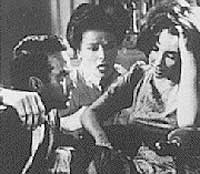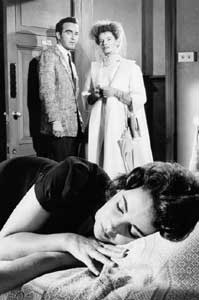 Suddenly, Last Summer (1959) was entirely the wrong story to attempt to movie at the height of the power of American film censors. Not that it was ever all that worthwhile a story. Tennessee Williams' over-the-top one-act play was about a man who used beautiful women to attract men, & who also exploits young boys in Europe. In the end, Greek street urchins gang together, chase down the pedarast (which as filmed was famously patterned after the villagers tracking down the monster in James Wales' Frankenstein) & most unbelievably eaten alive. Suddenly, Last Summer (1959) was entirely the wrong story to attempt to movie at the height of the power of American film censors. Not that it was ever all that worthwhile a story. Tennessee Williams' over-the-top one-act play was about a man who used beautiful women to attract men, & who also exploits young boys in Europe. In the end, Greek street urchins gang together, chase down the pedarast (which as filmed was famously patterned after the villagers tracking down the monster in James Wales' Frankenstein) & most unbelievably eaten alive.
What was originally a tastelessly absurdist expression of homosexual self-hatred, & of homosexual behavior in its worst manifestation of child exploitation, was turned into high camp after the film script was filtered through censors. Only the eaten-alive scene is at all hard-hitting, & even that's merely a capper to endless kitsch.
 Under the best of circumstances it could only have been a gay-bashing film, with a certain irony for being the sexual fantasy of a gay playwrite. But the film treatment is a cornpone monster movie with the some of the worst melodramatics that ever passed for acting. Although, to be fair to the key players, the subject matter is itself so luridly & foolishly melodramatic that lurid foolish performances were required, & make good entertainment whether or not inducing either giggles or disbelief. Under the best of circumstances it could only have been a gay-bashing film, with a certain irony for being the sexual fantasy of a gay playwrite. But the film treatment is a cornpone monster movie with the some of the worst melodramatics that ever passed for acting. Although, to be fair to the key players, the subject matter is itself so luridly & foolishly melodramatic that lurid foolish performances were required, & make good entertainment whether or not inducing either giggles or disbelief.
And if southern belles seem even more cartoonishly repulsive than the tale's almost invisible pedarast, it's because the whole idea of histrionic southern belles, as viewed through Tennessee Williams' sensibilities, are really more like drag-queens at base. The censors couldn't undermine that, as Gore Vidal went to heroic lengths to keep something of Williams intact while turning play into screenplay. If one imagines two flighty male drama queens in full drag, instead of leading actresses in the two main roles, then the campy performances begin to appear "realistic" in a hideously stereotypic manner.
The potentially intriguing casting of a gay actor like Montgomery Clift as the psychiatric lobotomist, trying to fathom what is never overtly stated, is rendered ridiculous by his slow-witted inability to realize what the heck Cathy is prattling on about while throwing herself from one end of the screen to the other, & which Violet is denying without direct reference to what it is she denies.
 It is no accident Clift came to this cast. To a surprising extent this "first" American film to have homosexuality as its primary (though still shadowed) theme was a project that winked exaggeratedly at gay Hollywood of the closety '50s. Liz Taylor from early in her life on counted gay men among her very closest friends (including Roddy Mcdowall & Montgomery Clift) such that she would later in life commit herself as an activist for gay men's health issues. So of course she was very open to being in this film. It is no accident Clift came to this cast. To a surprising extent this "first" American film to have homosexuality as its primary (though still shadowed) theme was a project that winked exaggeratedly at gay Hollywood of the closety '50s. Liz Taylor from early in her life on counted gay men among her very closest friends (including Roddy Mcdowall & Montgomery Clift) such that she would later in life commit herself as an activist for gay men's health issues. So of course she was very open to being in this film.
James Robert Parish's book on Katherine Hepburn revealed what formerly only Hollywood friends had known with any certainty, that she was indeed lesbian, as a couple generations of lesbians had already fathomed via gaydar. Gay film historian Vito Russo completely bought Hepburn's carefully crafted public persona & the story that she had never heard of homosexuality until director Mankiewicz explained it to her, & she refused to believe he was describing anything that actually existed. The fact is she was quite close to numerous Hollywood gays who were privately very out. So the subject was very personally well known to Kate.
She was merely closeted to the public, in a time that required her to be so, & her famous "love affair" with a man she could never marry (alcoholic, bisexual Spencer Tracy, her great friend being a perfect mutual beard) was a commonplace sort of cover-story single gays concocted so that the public would stop badgering to know why someone that sexy & talented never wed. She could be very coy, denying her closest relationships whenever asked, even while admitting that Phyllis Wilbourn, the last companion in her life, was "My Alice B. Toklas."
Adding a more notoriously lesbian actress to the cast, Marcedes McCambridge, who strives to make her character more despicable than all the other despicable characters, adds to the sense of Suddenly, Last Summer being an extended in-joke for Hollywood gays, which it was. We even glimpse Tennessee Williams & his lover Frank Marlo in cameos in the surgery sequence; & the climactic reference to James Wale's film is likewise a gay in-joke since Wale too was gay).
 We never see Sebastian's face even in the flashbacks, & he's already dead as the story opens. He remains a shadowy boogy-man, not a human character. The tale is told through the women in his life: Katherine Hepburn as Sebastian's grieving mother who wants her son's cousin Cathy lobotomized before she says too much about Sebastian's sexuality, & Elizabeth Taylor as the cousin & hysteric who wants her Aunt Violet to admit Sebastian only ever used them to attract men (& boys) for his deviant interests. We never see Sebastian's face even in the flashbacks, & he's already dead as the story opens. He remains a shadowy boogy-man, not a human character. The tale is told through the women in his life: Katherine Hepburn as Sebastian's grieving mother who wants her son's cousin Cathy lobotomized before she says too much about Sebastian's sexuality, & Elizabeth Taylor as the cousin & hysteric who wants her Aunt Violet to admit Sebastian only ever used them to attract men (& boys) for his deviant interests.
James Robert Parish's book on Katherine Hepburn notwithstanding (in which he alleges her to have been a lesbian) in the more certain aspect of her personal & political life she was excessively conservative & absoolutely no friend to gays. Liz Taylor on the other hand counted gay men among her very best lifelong friends & late in her life she became an activist for gay men's health issues. It's interesting to see these two divergent political minds acting out a script that can be viewed as highly condemnatory of homosexuality (pleasing for Hepburn's perspective) but a little deeper & more ironic than is at first evident (so embraceable by the more understanding Taylor).
The harsh constrasty b/w cinematography, if viewed as homage to Universal horror classics, can be striking in its appeal, this sense of horror cinema rather than realistic drama being heightened by scenes of the insane asylum. If a viewer just skips along tra-la-la embracing the idiotic story, never expecting it to rise above the level of B horror, it can be rewarding viewing, with even the parodic homophobia too vastly exaggerated to be insulting to anyone.
And baring in mind that famous faggots like arch-masochist Yukio Mishima & self-hating Tennessee Williams indeed had just this sort of eaten-alive-by-boys fantasy as part of their actual masturbatory repertoir, the film can even be intriguing for representing one strain of authentic gay sexual imagination. It may be this latter reality that has rendered Suddenly, Last Summer a cult classic that can still fill inner city art houses in revival, revelled in rather than deplored even by gay audiences.
copyright © by Paghat the Ratgirl
|

